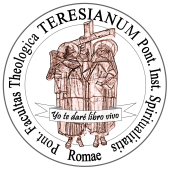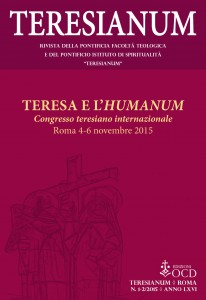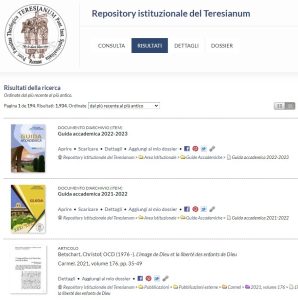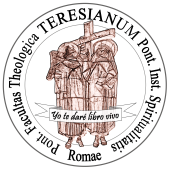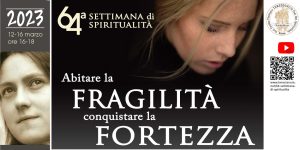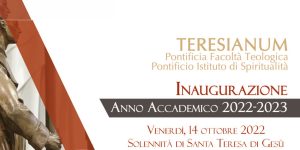Theological-Spiritual Journey: epistemological notes
“The Pontifical Institute of Spirituality offers specialization in Spiritual Theology. This is understood as a theological discipline that studies the experience of the Trinitarian life infused by the Holy Spirit in the heart of the human person” (cf. Statute, art. 8). This life has such an impact that it generates in the person a process of transformation that leads to an ever-increasing Christ-like life and, in Christ, an existence aimed at attaining the fullness of revelation. Therefore, Spirituality contains a strong evangelizing aspect, and a deepening participation in the prophetic mission of the Church. The well-known sources of Theology are associated with the lived experience of holiness in all forms of life, framed in Tradition and in the great figures of Carmel, with a wide interdisciplinary openness.
There are five aspects to consider in the epistemology proper to this theological science.
1. Spirituality is part of Theology. Which means that it develops from listening to the Logos of God, who speaks by revealing himself and communicating himself (DV 2) in different ways. These modes are unified in the Word made man, dead, risen and glorified, but always acting in the voice of the living Tradition of the Church, thanks to the guidance of the Spirit of the Risen One who leads to the whole truth (Jn 16:13). Therefore, the human logos of Spiritual Theology is clothed in a status responsionis of the human spirit that looks deeply at the mystery of God offered in human life, involving the intelligence in the process of knowledge. The understanding it provides is open to others, leading them to praise Christ, in whom the union of God and man is realized for the life of the world.
2. The object of the discipline is Spirituality understood as a Trinitarian life infused into the deep interiority of the human person. “Interiority” is understood here in the sense of the fundamental constituent of man, where man is impacted by the presence of the living God, to the point of feeling his heart burning, from which fruits of communion arise in ecclesial and social relations. Spiritual Theology discloses the journeying of humanity as a reality of union, a spousal reality of union in otherness. It is always asymptotic, although its reality is always offered in the divine Mediator, the Son of God, in whom the human and the divine inform life’s unity and communion.
3. Spiritual Theology is a discipline with its own identity and practice, close to Christian Anthropology. It accompanies and helps one to discern the ways of the free person who welcomes God’s offer, accepts and assimilates it, and finds there the truth of the person on the path to holiness. From here, transformation and growth of spiritual life become a path of freedom permeated by grace, empowering the person to fight against everything that tends to divide, and therefore to divert it away from the path of union that leads to the communio sanctorum.
4. The task of Spiritual Theology is developed sub ratione unionis. It unfolds in the light of the gift, the gift of wisdom. So the theologian of Spirituality will pursue a particular kind of intellectus fidei. This intellectus – which accords with the insight of St. Teresa of Jesus (cf. Life 17:5; 18:8) and with the Church’s recent Magisterium – may be articulated thsu: to live grace (phenomenal aspect), to understand and discern what grace it is about (cognitive aspect), to share with others such a great good (the mystagogic and testimonial aspect), to know how to proclaim the mystery of existence united to God (evangelizing aspect).
5. Spiritual knowledge unfolds in communion – at all levels: ecclesial communion in a listening community that receives, guards and authentically interprets the Word; a responsive community which obeys in faith; a community of life, and so of discipleship and mission; and this, to the extent that deep communion is lived, founded on the experience of the presence of the Risen One (Mt 18:20). In the didactic perspective of the Teresianum, these levels of community-communion generate the friendship of those who walk together in the company of Christ (Teresa of Jesus, Life, 16:7) in intellectual charity (A. Rosmini, Paul VI) to form a community of apprenticeship between teachers and students.
Methods
The methodology of Spiritual Theology at the Teresianum is marked by the following:
• A fundamental theological character;
• Human personal growth, anchored in a divine-human dynamism;
• Pastoral and mystagogic dimension;
• Community dynamics.
Among the approaches, we point out four in order of preference:
• Exegetical and hermeneutical required for the use of sources and for lingusitic interpretation;
• Systematic, so as to be able to communicate Spiritual Theology and its path to theological and spiritual knowledge;
• Integrative, so as to allow an interdisciplinary approach;
• Phenomenological, which consists in beginning from things in themselves, that is, approaching the subject considered from the point of view of its appearance purified of all circumstantial wrappings, so as to be able to see the subject in its proper consistency.
The specialisation in Spiritual Theology is intended for students who, after the theological studies of the Institutional Cycle, want to achieve the degrees of:
a) License Theology, specialising in Spiritual Theology (cf. Statute, art. 5c).
b) Doctorate Theology, specialising in Spiritual Theology (cf. Statute, art. 5c).
